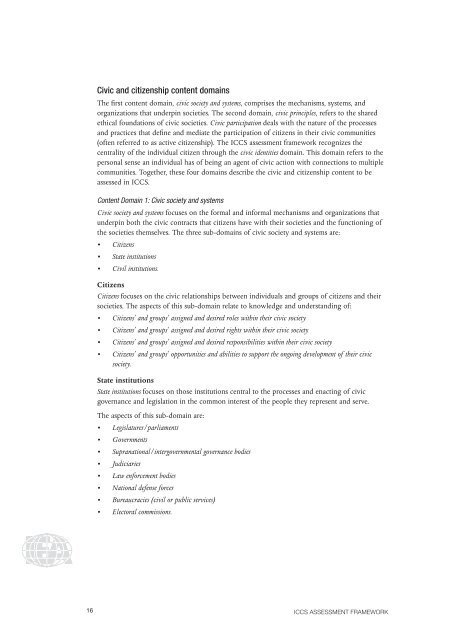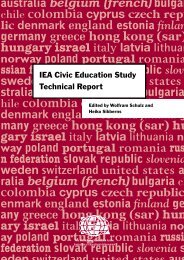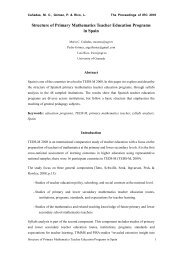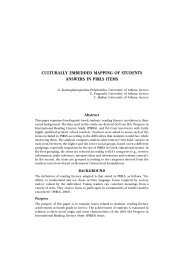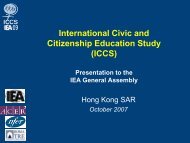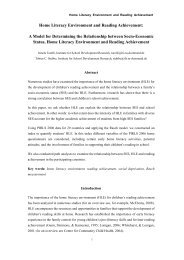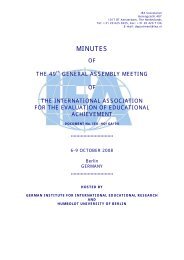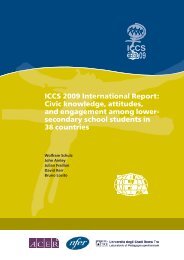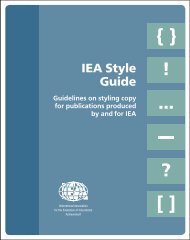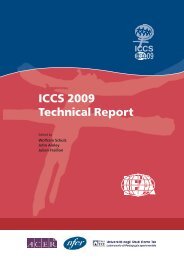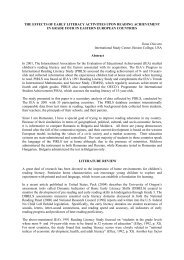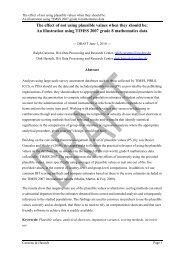International civic and citizenship education study - iccs - IEA
International civic and citizenship education study - iccs - IEA
International civic and citizenship education study - iccs - IEA
- TAGS
- civic
- citizenship
- iccs
- www.iea.nl
You also want an ePaper? Increase the reach of your titles
YUMPU automatically turns print PDFs into web optimized ePapers that Google loves.
Civic <strong>and</strong> <strong>citizenship</strong> content domains<br />
The first content domain, <strong>civic</strong> society <strong>and</strong> systems, comprises the mechanisms, systems, <strong>and</strong><br />
organizations that underpin societies. The second domain, <strong>civic</strong> principles, refers to the shared<br />
ethical foundations of <strong>civic</strong> societies. Civic participation deals with the nature of the processes<br />
<strong>and</strong> practices that define <strong>and</strong> mediate the participation of citizens in their <strong>civic</strong> communities<br />
(often referred to as active <strong>citizenship</strong>). The ICCS assessment framework recognizes the<br />
centrality of the individual citizen through the <strong>civic</strong> identities domain. This domain refers to the<br />
personal sense an individual has of being an agent of <strong>civic</strong> action with connections to multiple<br />
communities. Together, these four domains describe the <strong>civic</strong> <strong>and</strong> <strong>citizenship</strong> content to be<br />
assessed in ICCS.<br />
Content Domain 1: Civic society <strong>and</strong> systems<br />
Civic society <strong>and</strong> systems focuses on the formal <strong>and</strong> informal mechanisms <strong>and</strong> organizations that<br />
underpin both the <strong>civic</strong> contracts that citizens have with their societies <strong>and</strong> the functioning of<br />
the societies themselves. The three sub-domains of <strong>civic</strong> society <strong>and</strong> systems are:<br />
• Citizens<br />
• State institutions<br />
• Civil institutions.<br />
Citizens<br />
Citizens focuses on the <strong>civic</strong> relationships between individuals <strong>and</strong> groups of citizens <strong>and</strong> their<br />
societies. The aspects of this sub-domain relate to knowledge <strong>and</strong> underst<strong>and</strong>ing of:<br />
• Citizens’ <strong>and</strong> groups’ assigned <strong>and</strong> desired roles within their <strong>civic</strong> society<br />
• Citizens’ <strong>and</strong> groups’ assigned <strong>and</strong> desired rights within their <strong>civic</strong> society<br />
• Citizens’ <strong>and</strong> groups’ assigned <strong>and</strong> desired responsibilities within their <strong>civic</strong> society<br />
• Citizens’ <strong>and</strong> groups’ opportunities <strong>and</strong> abilities to support the ongoing development of their <strong>civic</strong><br />
society.<br />
State institutions<br />
State institutions focuses on those institutions central to the processes <strong>and</strong> enacting of <strong>civic</strong><br />
governance <strong>and</strong> legislation in the common interest of the people they represent <strong>and</strong> serve.<br />
The aspects of this sub-domain are:<br />
• Legislatures/parliaments<br />
• Governments<br />
• Supranational/intergovernmental governance bodies<br />
• Judiciaries<br />
• Law enforcement bodies<br />
• National defense forces<br />
• Bureaucracies (civil or public services)<br />
• Electoral commissions.<br />
16 ICCS ASSeSSment FrAmework


